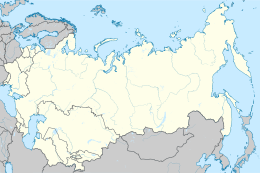Commons:Urheberrechtsregeln nach Gebiet/Sowjetunion
|
Urheberrechtsregeln: Sowjetunion Kürzel: COM:Soviet Union | |
 | |
 | |
| Schutzfrist | |
|---|---|
| Standard | 25 Jahre p. m. a. |
| Andere | |
| Gemeinsame Lizenzvorlagen |
{{PD-old-auto}} {{PD-RusEmpire}} {{PD-RU-exempt}} |
| Abkommen | |
| Welturheberrechtsabkommen | 27. Mai 1973 |
Diese Seite bietet einen Überblick über die Urheberrechtsbestimmungen der ehemaligen Sowjetunion, die für das Hochladen von Werken in Wikimedia Commons relevant sind. Beachte, dass jedes Werk aus der ehemaligen Sowjetunion sowohl im Ursprungsland als auch in den Vereinigten Staaten gemeinfrei oder unter einer freien Lizenz verfügbar sein muss, bevor es auf Wikimedia Commons hochgeladen werden kann. Bei Zweifeln über den urheberrechtlichen Status eines Werks aus der ehemaligen Sowjetunion solltest du die entsprechenden Gesetze zur Klärung heranziehen.
Hintergrund
The Union of Soviet Socialist Republics (USSR), or Soviet Union, was a state that spanned large parts of eastern Europe and northern Asia that existed from 30 December 1922 to 26 December 1991. It succeeded the Russian Empire, and comprised 15 nominally independent republics.
Before 1 June 1973 the general term of protection was for the lifetime of the author plus 15 years after death. The Soviet Union joined the Universal Copyright Convention on 27 May 1973, and the term of protection was retroactively extended to life plus 25 years. This remained in effect until the USSR was dissolved.
Successor states
In 1991 the Soviet Union was dissolved. 12 of the republics formed the Commonwealth of Independent States (CIS), and are the legal successors of the USSR. These are Armenia, Azerbaijan, Belarus, Georgia, Kazakhstan, Kyrgyzstan, Moldova, Russia, Tajikstan, Turkmenistan, Ukraine and Uzbekistan. The three Baltic republics, Estonia, Latvia and Lithuania took the position that they had been occupied countries rather than members of the USSR, and chose not to join the CIS.
Works published in the former USSR should be in the public domain under the laws of the successor country of origin and the United States if they are to be uploaded to Wikimedia Commons.
Note: There was a discussion whether pre-1973 works from the Soviet Union are copyright-free, originating in the period of uncertainty after the dissolution of the Soviet Union. It was concluded that this theory is incorrect; see discussions in Template talk:PD-Soviet.
Lizenzvorlagen
- {{PD-RusEmpire}} for works published before 1917
- {{PD-RU-exempt}} for works exempt from copyright
Währung
Siehe auch: Commons:Währung
![]() OK Former USSR currency is not copyrighted.
OK Former USSR currency is not copyrighted.
Please use {{PD-RU-exempt}} for images of Soviet (USSR) currency.
Panoramafreiheit
Siehe auch: Commons:Panoramafreiheit
Most of the successor nations of the Soviet Union have identical provisions on freedom of panorama and restrict it to non-commercial uses only. Refer to the pages describing the copyright rules for each member state for current rules.
Briefmarken
Siehe auch: Commons:Briefmarken
![]() verwende {{PD-RU-exempt|stamps}}
verwende {{PD-RU-exempt|stamps}}
Since, according to intergovernmental and international treaties, Russian Federation is a legal successor to the Russian Soviet Federative Socialist Republic and the Union of Soviet Socialist Republics, the tag {{PD-RU-exempt}} (please see "Russia" above) also applies to images of postage stamps, stamped covers and stamped post cards (postal stationery) of the RSFSR and USSR.
Siehe auch
- Союз Советских Социалистических Республик
- Category:Stamps of the Soviet Union
- COM:CRT/Armenien
- COM:CRT/Aserbaidschan
- COM:CRT/Belarus
- COM:CRT/Estland
- COM:CRT/Georgien
- COM:CRT/Kasachstan
- COM:CRT/Kirgisistan
- COM:CRT/Lettland
- COM:CRT/Litauen
- COM:CRT/Moldau
- COM:CRT/Russland
- COM:CRT/Tadschikistan
- COM:CRT/Turkmenistan
- COM:CRT/Ukraine
- COM:CRT/Usbekistan
Zitate
- ↑ TACIS Retroactivity Report (Russia). Russian-Ukrainian Legal Group (11 April 2001). Retrieved on 2019-02-10.